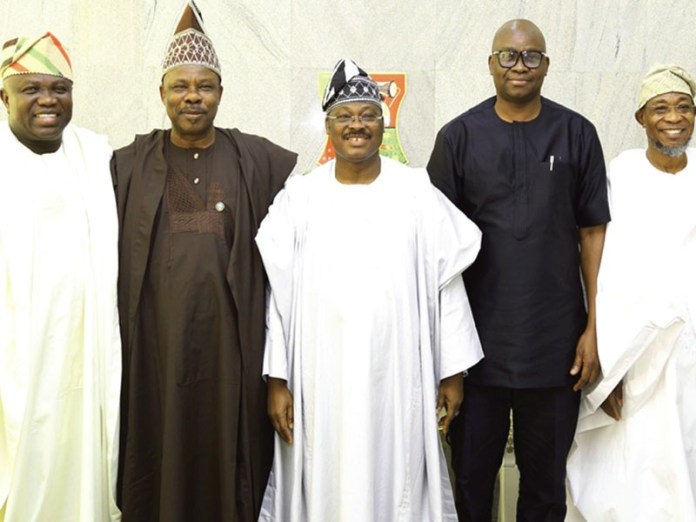- South West Governors: Politics, External Influence will Not Divide Us
State governors in-the South-western geo-political zone in Nigeria have resolved to forge a common front at regional integration by jointly staving off external influences capable of stifling the region’s economic and social interests.
Irrespective of their political affiliations, the governors said they have decided to be their brother’s keeper by promoting common programmes and projects capable of enhancing the human capital development of the region.
This was one of the highlights of the meeting of the governors’ economic forum, hosted yesterday by the Governor of Oyo State, Senator Abiola Ajimobi, at the Executive Council Chambers, in Ibadan.
The governors mulled the need to introduce uniform tariffs on commodities, while agreeing on the need to seek areas of cooperation in agriculture, transportation, rail system, sports and other areas of common interest.
Other governors at the meeting were Mr. Akinwumi Ambode of Lagos State; Rauf Aregbesola of Osun State; Senator Ibikunle Amosun of Ogun State and Mr. Ayodele Fayose of Ekiti State, while Secretary to Ondo State Government, Mr. Rotimi Adelola, represented Governor, Dr. Olusegun Mimiko.
In his welcome address, Ajimobi said the attendance of the governors signposted the high importance they paid to the common challenges besetting the zone, part of which he said was the difficulties in the prompt payment of workers’ salaries and pensions.
Ajimobi said: “Your presence at this meeting is a clear testimony of the importance you all have attached to the common challenges confronting us as a people. Today, our country is buffeted by economic and political challenges.
“Several states are struggling to pay basic salaries with arrears running into several months; manufacturers struggling to access foreign exchange for raw material and companies are shutting down leading to mass redundancy of our people.
“Unfortunately most of these people are resident in the South-west region, which is the industrial base of the country. We need to quickly explore escape routes from poverty through empowerment and equipping of our youths with requisite skills.
“We must also seek common path of boosting agriculture as well as dealing with security challenges that have pervaded the country. We must seek a way out of the biting hardship in the land.”
The governor expressed optimism that the outcome of the meeting, which he said was an economic forum, would lead to steps that would impact positively on the social and economic development of the people.
A communiqué read at the end of the meeting by Fayose said the forum reiterated the need to use regional integration to create economic relief for the people of the South-west in the face of the pervading economic recession.
Fayose stressed that the conversation dwelt on pragmatic steps necessary to be taken to enhance the development of the region and to proffer the surest way to put food on the table of the common people.
Regardless of their political differences, he said the governors were more concerned about their relations by the force of history and geographical location, the unity of which, he said, the regions forebears fought for and defended.
Fayose said: “All states, including Ekiti, have subscribed to and agreed that regional integration is the best way forward. We must do everything humanly possible not to go back on our resolves. It is forward for the people and for the Yoruba race.
“We agreed that the next meeting, which holds in the next two months, would be held in Ekiti State.”
He said the meeting was unanimous in its resolve to strengthen the Development Agenda for Western Nigeria (DAWN Commission) and the Odua conglomerate to foster regional integration and development.
Fayose said the managers of both pan-Yoruba organisations have been admonished to remain apolitical and to play a neutral role in their relationship with the owner states.
Earlier, the governor had told the forum to examine issues of common concern and learn from models that had worked for one state, with a view to replicating them for the common good of the people.
For instance, Fayose disclosed that the grazing regulation Law just passed in Ekiti had restored sanity to the land, adding that others could take a queue from the Law in order to protect farmers from avoidable losses occasioned by destruction of farm lands by straying cattle.
Aregbesola pleaded with his colleagues to take advantage of the remaining period of their tenure by ensuring that they redoubled their efforts to ensure the survival and prosperity of the people of the region.
Amosun also restated the need for the governors to shed their political differences by walking in the footsteps of the region’s nationalists and torchbearers, stressing that the unity of the region would be its strength.
He noted that the political differences of the governors of the region should not be a hindrance to exploring the economic possibilities in each state using comparative advantages as measuring index.
Ambode reminded his colleagues that the touted prosperity of Lagos State could only be sustained by the prosperity of its neighbour states.
He said he was committed to the improvement in the revenue base of the South-west such that a rail system would make it possible for people to work in Lagos State and live in Osogbo, the Osun State capital.


 Forex2 weeks ago
Forex2 weeks ago


 Naira1 week ago
Naira1 week ago
 Naira4 weeks ago
Naira4 weeks ago
 Company News4 weeks ago
Company News4 weeks ago




 Naira1 week ago
Naira1 week ago




 Naira3 weeks ago
Naira3 weeks ago
 Billionaire Watch1 week ago
Billionaire Watch1 week ago




 Naira7 days ago
Naira7 days ago





















